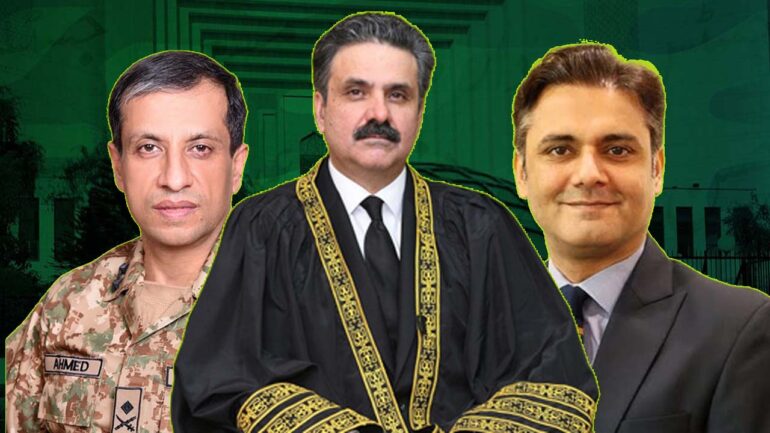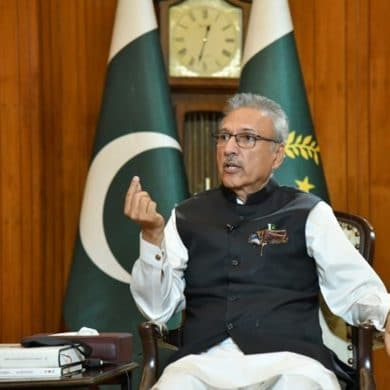Attorney General for Pakistan (AGP) Mansoor Usman Awan informed the Supreme Court Tuesday that trial of civilians, who were arrested for vandalizing sensitive installations, had not yet started in the military courts.
His statement, however, contradicted Director General (DG) Inter-Services Public Relations (ISPR), Major General Ahmed Sharif Chaudhry who the other day stated otherwise, said the counsel of Pakistan Tehreek-e-Insaf (PTI) chairman who, among others, filed a petition challenging the government’s decision to try civilians in military courts.
The DG ISPR said in a press conference the other day that trials of 102 individuals handed over to military courts were already underway.
A larger bench of the Supreme Court, headed by Chief Justice Umar Ata Bandial and comprising five other justices, including Justice Ijazul Ahsan, Justice Muneeb Akhtar, Justice Yahya Afridi, Justice Ayesha Malik, and Justice Mazahir Ali Naqvi, heard the case.
Various petitions were filed by notable figures such as PTI Chairman Imran Khan, former Chief Justice Jawwad S. Khawaja, legal expert Aitzaz Ahsan, and five civil society members, urging the Supreme Court to declare military trials of civilians unconstitutional.
The government has already announced its intention to try those involved in the May 9 violence, which resulted in the vandalism of government buildings and army installations, under the jurisdiction of army laws.
During the previous hearings, lawyers representing the petitioners, including Khawaja Ahmed Hussain, counsel for the ex-Chief Justice, Latif Khosa, counsel for Aitzaz Ahsan, and civil society lawyers Faisal Siddiqui and Salman Akram Raja, presented their arguments.
However, during the recent hearing, the PTI chief’s counsel pointed out the conflicting statements made by the AGP and the ISPR DG regarding the ongoing trials. In response, the AGP reaffirmed his earlier statement and suggested that representatives from the Ministry of Defence present in the court could provide better clarification.
The debate during the hearing focused on the constitutionality of trying civilians in military courts under the Army Act.
Lawyer Bhandari, representing the petitioners, argued that civilians should not be subjected to military trials.
He emphasized that the powers and jurisdiction of military courts should be reserved for soldiers, and it needed to be determined whether civilians could be tried in military courts for offenses related to the armed forces.
Continuing his arguments, the PTI counsel argued that civilians could not be deprived of fundamental rights.
Justice Ayesha observed that Section 2D of the Army Act says it will apply to those not members of the armed forces.
Bhandari responded that it applied only to those civilians who “influence” the forces’ operations.
Justice Naqvi asked: “How did the ATC allow the transfer when the crime listed in the Army Act is not on record?”
The PTI counsel said: “Article 175 (3) of the Constitution deals with the judicial procedure.”
“Articles 9 and 10 of the Constitution talk about fundamental rights,” adding that while these articles are separate, they are related.
“Fundamental rights require that the judge appointed under Article 175 (3) should conduct the trial,” Bhandari contended and said that the court martial of civilians does reflect nicely on the judicial system.
“No one willingly allowed civilians to be tried in military courts,” he said.
“For trial under the Army Act, the offence must be under the Official Secrets Act, Justice Ayesha noted, requesting that the Official Secret Act be produced.
According to the Official Army Act, it is an offence to attack or use any restricted area for the enemy’s benefit, Bhandari said.
The CJP then remarked on the importance of army officers’ morale.
Following this, the hearing was adjourned for half an hour.
After the hearing resumed following a 30-minute break, advocate Bhandari continued his arguments.
He contended that in a case against Ahmed Faraz for writing poems against the army, it was said that the Army Act did not apply to civilians.
The PTI counsel also requested that those responsible for May 9 events be given open public trials conducted under anti-terrorism provisions.
He said the FIRs on May 9 and the subsequent days were filed under anti-terrorism provisions, adding that these were bailable offences and did not come under the Army Act.
At this, Justice Akhtar inquired: “When no one comes under the ambit of the Army Act, how can action be taken against them?”
The CJP concurred and said it was beyond understanding how the army could arrest someone if there was no evidence against them.
Justice Ahsan remarked: “According to the record, there is no charge against the arrested persons. How can someone be kept in military custody without charge?”
The CJP then observed that the bench would have to ask the AGP for details that would be important to parents.
The AGP assured the court that a complete legal process had been followed before the arrests were made. He disagreed with the petitioner’s statements and expressed his intention to submit all relevant documents for judicial review.
The AGP also provided details of the 102 individuals currently in military custody, mentioning the facilities available to them, including contact with their families.
The issue of making the list of those in military custody public was discussed, with the bench divided on the matter. While some justices believed it should be made public for transparency, others expressed concerns about the well-being and security of the individuals involved.
The hearing concluded with the court adjourning the case until after Eid, instructing the AGP to ensure the welfare of the arrested individuals, particularly journalists, lawyers, women, and children. The Supreme Court will reconvene in the first week after Eid to further address the trial of civilians in military courts.



